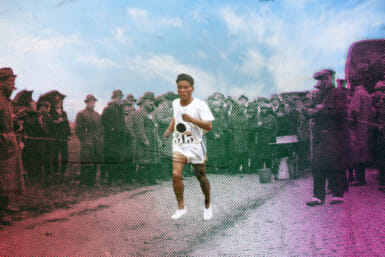Daniel Defoe’s masterpiece Robinson Crusoe comes out in 1719 and has never since been out of print.
Yet how easily it might never have been written and even more easily never have appeared. Defoe has a hard time finding a publisher and in the end, even though he is heavily in debt, sells the manuscript for a paltry £10. It is an immediate roaring success so at least he basks in fame in his own lifetime.
He never knows, though, the impact his story has on future generations nor that he will be lauded as one of the first authors in England to write novels in the modern form. Before he sets new standards with Robinson Crusoe and Moll Flanders, books are written as long poems or dramas.
Daniel Defoe is born in 1660. By his early 20s he is a successful merchant and has made a good marriage, which will produce seven children. Had his business flourished and had he stayed away from politics, he might never have become a writer.
However, in 1685 he joins a doomed rebellion against the King. The failure of the insurgency forces him for several years into semi-exile on the continent. He neglects his business and by 1692 is bankrupt, never again in his life to be free of debt. His political views land him in the public stocks and later in prison. He is perhaps the only pillioried person in England ever to become a national hero.
While Defoe struggles to support his family in England, destiny is weaving his fate with that of Alexander Selkirk, a wild young Scotsman. In trouble at home, Selkirk runs away to sea in 1704. After some years of swashbuckling in the Pacific, he is on a ship between South America and Europe.
The crew is weakened by fever, gangrene and scurvy. The ship itself is being eaten away by worms. Selkirk fears it will sink before it reaches Europe. One version of what happens next has Selkirk impulsively asking to be left on the next island where there is water.
Another version has Selkirk violently quarreling with the captain, being charged with mutiny, and being dumped on a desert island. In this second version, Selkirk begs for pardon but is rejected.
However it happens, the real-life Robinson Crusoe endures four years and four months on a desert island some 600 kilometers off the coast of Chile. Finally rescued, and after two further years at sea, he returns to England in 1711. He is now a wealthy man and a celebrity. However, everyday life bores him and he succumbs again to the lure of the sea. At the age of 45 he dies off the coast of West Africa.
It is possible that the journalist Defoe meets and interviews Selkirk while he is in England. It is more likely, though, that reading about Selkirk sparks the idea for Robinson Crusoe. Defoe’s fictional hero is a highly moral man, totally self-sufficient, who survives 27 years on a Caribbean island. His is a story of faith and courage, and his ability to survive the ultimate tests of nature is an inspiration to many.
Rene Caillie is a Frenchman born in poverty in 1799. He reads Robinson Crusoe and is fired with ambition to become an explorer. However, he chooses land over water. He is captivated by tales of the riches and splendor of Timbuktu, apparently a city of wealth in the desolation of the Sahara Desert.
No European has yet reached Timbuktu and returned to tell of it. Caillie spends 11 years in preparation before, in 1827, embarking on a long, dangerous overland trek. A year later he enters Timbuktu and is almost overcome with joy, and gratitude for what he feels is divine protection. As his euphoria fades, though, he looks about him and realizes that the stories of magnificence are but fables. There is nothing here except “a mass of ill-looking houses, built of earth,” and nothing to see but “immense plains of quicksand.”
Still, Caillie is the first European to see Timbuktu and return to tell his story. Who knows what he might have done with his life had he not read Robinson Crusoe?
In the mid-19th century when the British East India Company effectively rules India, it sends two English officers to Bukhara, in today’s Uzbekistan. This is a secret mission to offer the emir an alliance with the British against other foreign powers.
The officers are suspected of spying and tossed into a vermin-infested dungeon. Hearing nothing from them for many months, the East India Company fears the worst. The British government will do nothing since the officers are not on official business. Public sentiment in England is aroused, though, and money raised to finance a fact-finding mission.
An eccentric clergyman, Joseph Wolff, volunteers to travel from England to Bukhara. He is a Bavarian Jew, married to a titled Englishwoman, and an unlikely knight in shining armor. He knows the men are probably already dead (as, indeed, they have been for 18 months before he even leaves England.) Wolff knows he is risking his own life, but is undeterred at the prospect of six months of overland travel to reach Central Asia.
Off he goes, in his clergyman’s gown and cassock, hood and shovel hat. In his luggage he carries as presents and bribes a dozen Bibles, several dozen silver watches, dozens of maps, and three dozen copies of Robinson Crusoe, translated into Arabic.
Wolff takes the books because on a previous journey to Arabia his gifts of Robinson Crusoe “excited a great sensation.” Crusoe’s adventures and wisdom are read, believed and admired in the market places of Sana’a, Hodeida and Luhaiya. On this journey to Central Asia he even meets a British colonel who has a servant he has named Friday.
Wolff s journey is in vain and he is himself held prisoner for months in the holy city of Bukhara. However, he survives and for the rest of his life dines off his accounts of his exploits.
What a shame Daniel Defoe cannot know these stories, or know that today there are people on the Caribbean island of Tobago who claim to be descendents of Robinson Crusoe. Not, mind you, of the real life Alexander Selkirk. No, indeed, their ancestor is the fictional Robinson Crusoe.









